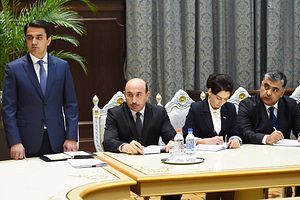In April, a dozen officials and investigators from the Tajik anti-corruption agency were arrested for corruption.
The chairman of the Tajik parliament’s lower chamber, Shukurjon Zuhurov, commented during a late-April parliamentary session, “It turns out that many officials who should be fighting corruption are in fact corrupt officials themselves.” He said it was necessary “to bring such officials to justice.”
Dushanbe was quiet on the matter, with the head of the anti-corruption agency, Sulaimon Sultanzoda, telling RFE/RL that information related to the issue was classified. In that vein, closed-door trials in the Supreme Court began in July for 14 individuals, ten from the anti-corruption agency and four others.
The exact numbers have fluctuated as others have been arrested. But because the government refuses to comment on the arrests, RFE/RL and others have to confirm the detentions by talking to relatives of those believed to have been arrested, who, for obvious reasons, may not be willing to say much.
Nevertheless, the who’s who of those arrested is an extensive review of key anti-corruption officials, such as Davlatbek Hairzoda, the agency’s former deputy, and Firdavs Niyozbadalov, an investigator with political connections who was heavily involved in the takedown of Zaid Saidov, a former regime insider-turned-opposition figure and presidential hopeful who was sentenced to 26 years on a wide array of crimes from fraud and corruption to polygamy in 2013. His sentence was extended by three years in 2015.
As Asia-Plus reported in July when the trials began, journalists asked whether these cases — accusations of fraud and bribery among anti-corruption officials — would lead to a review of those individuals arrested and jailed by the corrupt investigators, namely Saidov. Shermuhammad Shohiyon, chairman of the Supreme Court, said, “no.”
This week Asia-Plus reported that Hairzoda was found guilty of taking bribes and sentenced to 10.5 years in prison. The same day Hairzoda’s verdict was announced, Fariddun Benazirzoda, former deputy head of the Sughd customs service, was convicted of taking bribes and sentenced to 10.6 years in prison.
Because the trials are closed, what evidence was presented is unknown.
In any case, whether these men are guilty or not of bribery, there is an obvious omission in this purge of top-tier anti-corruption officials. The son of President Emomali Rahmon, Rustam Emomali, was head of the anti-corruption agency until January when he was made mayor of Dushanbe, sidelining the man who’d held that post for nearly two decades. Rustam had been made head of the agency by his father in March 2015 and had, before that, been head of the customs service since 2013.
Then again, it wouldn’t matter if Rustam was corrupt; the Tajik president and his family are protected by immunity granted through a late 2015 law honoring Rahmon as the “Leader of the Nation.”

































